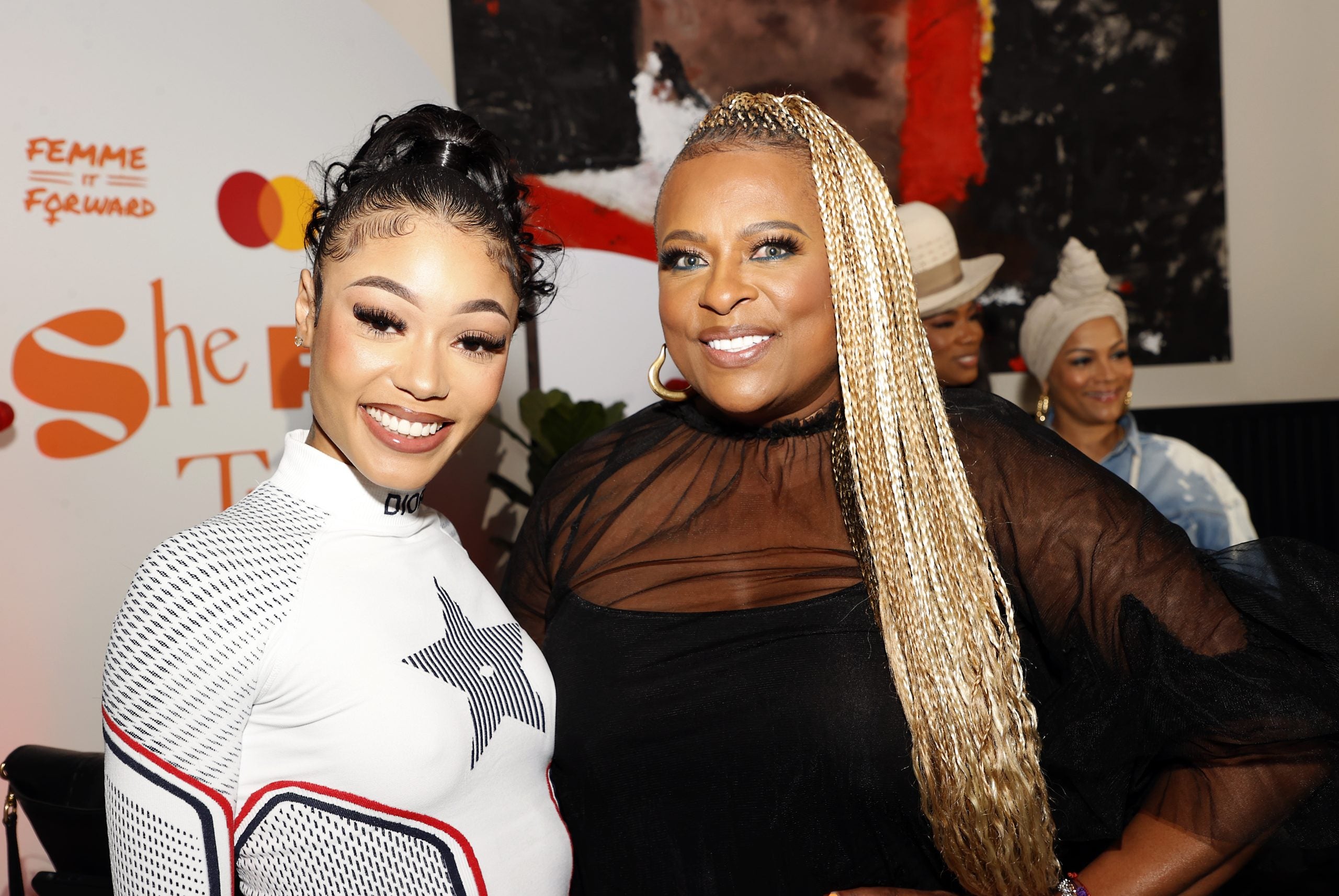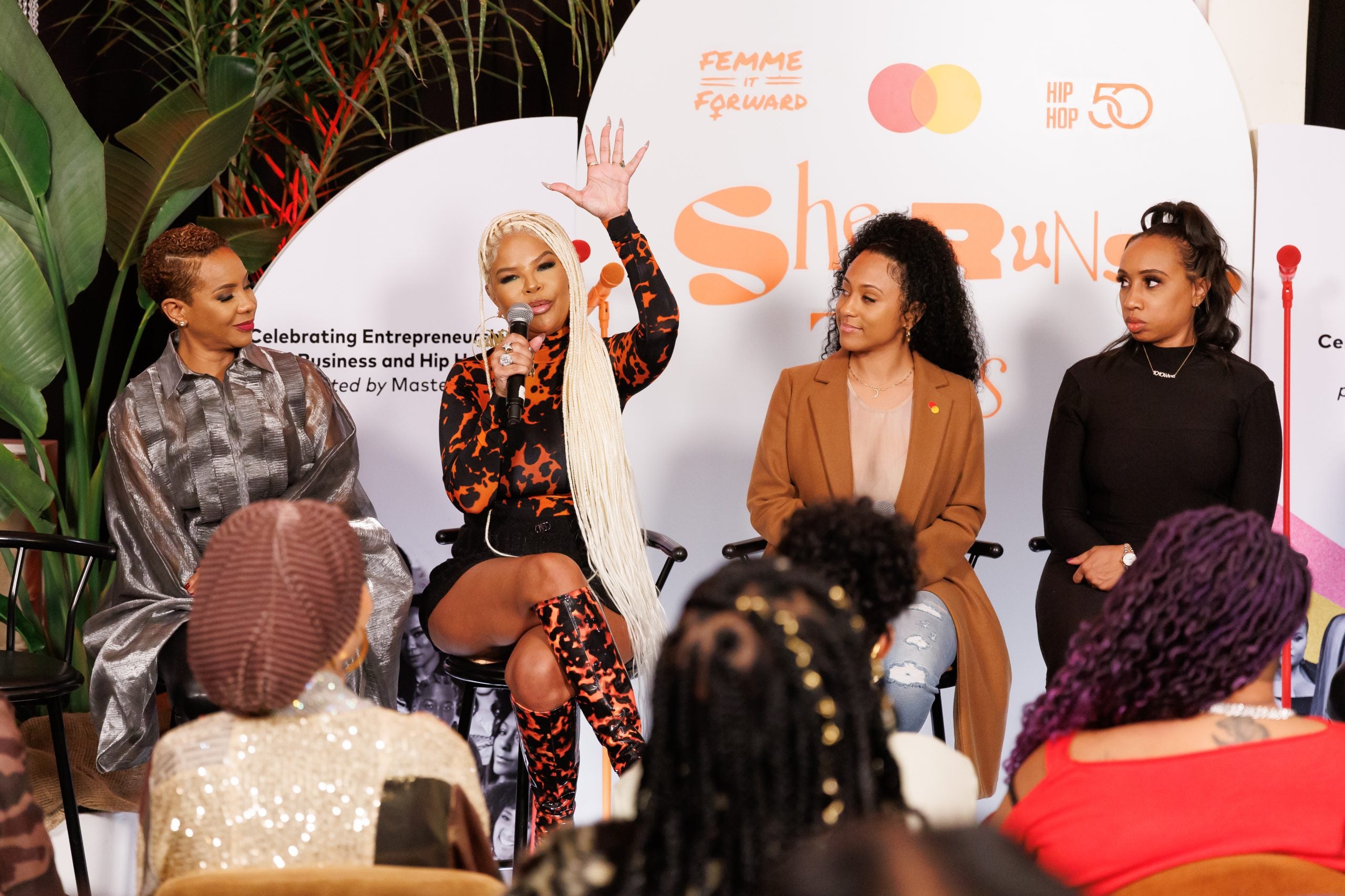
Fresh off the heels of the 65th Grammy Awards ceremony – the historic event where Beyoncé became the most awarded recipient in Grammy history – a group of pioneering women gathered together to examine the current state of Hip Hop music and discuss the importance of Black female empowerment.
The star-studded roster was formed by Heather Lowery and her groundbreaking Femme It Forward initiative, partnering with Mastercard for its inaugural “She Runs This” panel series. Taking place over the course of three-days in Los Angeles, the panels featured industry veterans including Salt-N-Pepa, MC Lyte, Lil’ Kim, and fast-rising upstarts such as Coi Leray and Baby Tate.
Discussing the trials and triumphs of being a Hip Hop entrepreneur, Lil’ Kim exclaimed, “A boss can take a loss, but a boss can get it right back!” Other topics of conversation included challenges that Black female entrepreneurs face when starting a business (along with racism and bias), the importance of women artists being able to have equity and financial tools of success through Hip Hop, and having the freedom to follow one’s dreams.

Grammy-winning and Oscar-winning artist Jennifer Hudson was a featured host for one of the week’s panels, and spoke about being inspired as a business woman. “It wasn’t until my venture and partnership with Mastercard that I realized that I was being supported as a Black woman, and as an entrepreneur. We already know who we are [as Black women], but it’s important to know what we can do with a platform and the support to be able to do business,” says Hudson.
Celebrity fashion stylist and style architect Misa Hylton was another featured panelist who weighed in on the importance of business adaptability in uncertain economic times. “At the height of the pandemic when in-person activity was at a standstill, I was initially opposed to doing virtual classroom settings for my Fashion Academy because I didn’t know what it all entailed, and I was nervous to try something new. But I had to put that fear aside, and by opening myself and my business up to doing hybrid classes, it allowed our enrollment to triple and exponentially soar – even internationally,” she shared.

Regarding the future of Hip Hop and what success in business looks like, trendsetting artist Baby Tate said, “Success is personal and can look like a whole bunch of things to different people – it can look like being able to pay your rent every month or being able to fly your friends out.”
“Being an artist is not something that’s easy to do, and I realize that I can’t quit because it’s bigger than me; I’m doing it for the fans now. Music streams don’t really do a lot for artists, and I’ve dealt with homelessness and I was down real bad, but once I got to a place where I started making money from music that’s when I knew I didn’t have to be so hard on myself or be on a super hard grind,” Tate added.
Mastercard’s research has found that 80% of this country’s female content creators, small business owners and entrepreneurs too often report some kind of financial challenges. This data has motivated the company to invest $500 million in Black communities and continue its partnership with the Fearless Fund, and collaborate with Amazon to promote Black women-owned small businesses.
Sharing the same sentiment as each of the week’s panelists, Mastercard North America’s Executive Vice President of Marketing and Communications, Rustom Dastoor, said: “We are proud to support these fearless Black women artists and business owners in their pursuit of redefining what’s possible, and we’re excited to watch them take their stage, follow their passions and thrive.”
On the topic of accessibility to financial tools and Black female empowerment, Hip Hop icon and Grammys broadcast announcer MC Lyte told ESSENCE, “With the right team, anything is possible, and if there’s one thing I’ve learned, no box can define an artist who is willing to do their craft with nothing in exchange. I always dreamed of using my voice in a significant way, and everything that I’ve voiced until now has allowed me the opportunity to be front and center and entertainment. Launching Sunnigyrl Inc. as a management, and production company, I look to executive produce, create, direct, act and take projects from development to the finish line.”

“Coming up I watched women who were executives, like Sylvia Rhone, Ruth Carson, Johnnie Walker. These women inspired me to want to be a part of something larger as it relates to music. They showed leadership and tenacity in a male dominated field, where not many women were accepted as bosses. They showed it could be done!” adds Lyte.
Ending on a note of sisterhood, self-awareness and solidarity, rap legends Salt-N-Pepa added valuable commentary that summarizes the panel’s goal, “Know how to separate the music business from who you are as a person, so that you can gain more understanding of your goals. Definitely block out the haters and naysayers because they don’t know what you know. Do not respond to any of the negative and once you understand that, the negative stuff won’t bother you.”
Added Lil’ Kim, “When I got in the [rap] game, I never wanted to go up against my sisters, I wanted to go up against the boys because the industry was more male dominated. Sisterhood is so important and I want my sisters to feel loved because it’s a good feeling.”
More information on Femme It Forward and Mastercard’s Solidarity in Action program to close the racial wealth gap can be found on its website.